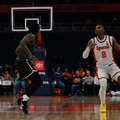Political candidates magnify voices through use of Internet
As a college student in the 1960s, Larry Elin was into democracy in a way that took him from simple protest to uprisings.
The professor in the S.I. Newhouse School of Communications was one of two faculty members leading Wednesday’s lunchtime discussion, titled ‘The Internet, Elections and Beyond!’ in Eggers Hall.
‘I was a part of the group that took over the chancellor’s office here at SU during the revolution,’ Elin said. ‘Check out the Daily Orange photo archives. There’s a picture of me with my boots on the chancellor’s desk smoking one of his cigars.’
The ’60s are long gone, but a new age has ushered in a new means of participating in American democracy. These new mediums are the focus for the series of informal lunchtime discussions, hosted jointly by Newhouse and the Maxwell School of Citizenship and Public Affairs. The roundtable discussions provide a venue for interchanges between faculty and students on journalistic and political issues.
‘The Internet is an alternative medium that exerts democratic forces in an egalitarian way,’ said Grant Reeher, a political science professor in the Maxwell School. Reeher, who opened the discussion, talked broadly about the relationship between the Internet and politics.
The rise in participation especially can be attributed to the Internet and its ability to make broader and deeper efforts to organize a constituency, Reeher said. Online registration options have proven to be a powerful and effective tool in adding voters to the registration rolls.
It’s a sure thing that increased access granted by net will inherently amplify voter turnout, but the hordes of new constituents give rise to a whole new set of questions.
This uncertainty strikes fear into the hearts of both Republicans and Democrats alike, Reeher said. Online registration isn’t the only revolution of the World Wide Web to the election efforts; the ability to donate to a political campaign via the Internet breeds a new kind of contributor.
‘It’s much easier to enter your Visa number and tap your mouse than write and mail a check,’ Reehar said. ‘The people who write checks look a little different from people who donate online.’
While the Internet is shaking up the demographics of U.S. voters and donors, it is also making life easier on candidates.
‘Money is coming in online from numerous locations, and campaigns are better able to take that money, no matter how small the amount, because processing on the Internet is vastly cheaper than processing cash or checks,’ Reeher said.
Even though the Internet played no major role in the 2000 elections, President Bush was the first to utilize the web to mobilize local and grassroots volunteers successfully.
As Reeher opened the floor for discussion, the dialogue shifted from the Internet’s effect on elections to its effect on democracy. According the Maxwell-Newhouse duo, the Internet is poised to affect American democracy in very tangible ways.
‘The Internet gives a voice to people who didn’t have one before,’ Elin said, citing Web logs as a primary example. But even with the blogging phenomenon, the mainstream media institutions have latched onto specific blogs and created a kind of hierarchy in the blogosphere, Reeher said.
Reeher steered the discussion toward the larger, social effects of the Internet, focusing on what he called a ‘digital divide,’ the concern that the Internet could be acting as a marginalizing knife. Since there is little doubt that the Internet is more available to middle and upper-class citizens, it threatens to alienate the lower class.
Reeher disagrees with this statement.
‘It isn’t the access that’s important, it’s how that access is used,’ Reheer said. ‘Watching E! online is very different from organizing a campaign online.’
‘It doesn’t degrade democracy, it enhances it,’ Elin agreed.
Expanding on Reeher’s argument, Elin said, ‘Seams are disappearing.’ The Internet is allowing people to cross boarders in ways not possible 10 years ago, he said.
The Internet can break down walls and rip apart seams, but it can’t cure structural ailments, Elin said. When asked by one student if the Internet could help give third parties a voice, Elin shook his head.
‘The structural constraints on a third party make it impossible for it to survive,’ Elin said. ‘Problems with the (democratic) framework can’t be fixed by the Internet.’
And maybe that’s the way it should be, suggested Elin.
‘Ordinary people will always be doing more extraordinary things with the Internet than political institutions,’ Elin said. ‘But maybe that’s just the hippie college kid that smokes the chancellor’s cigars in me.’





